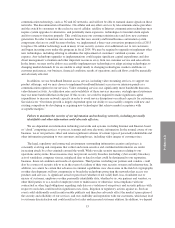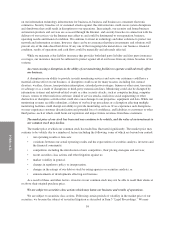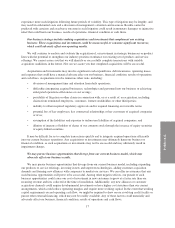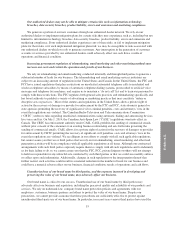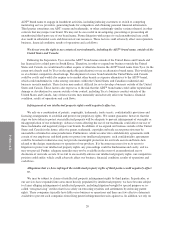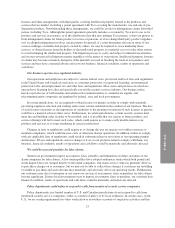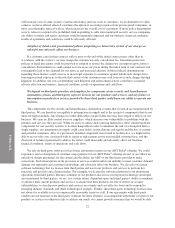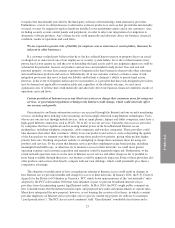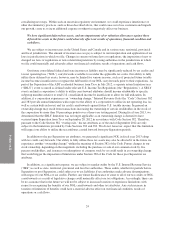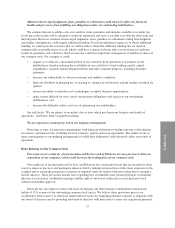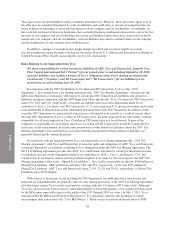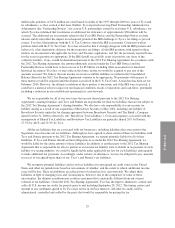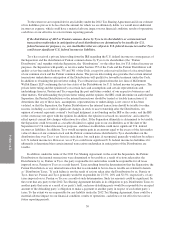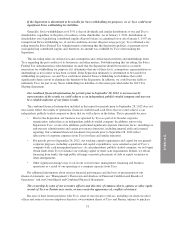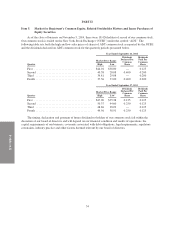ADT 2014 Annual Report Download - page 90
Download and view the complete annual report
Please find page 90 of the 2014 ADT annual report below. You can navigate through the pages in the report by either clicking on the pages listed below, or by using the keyword search tool below to find specific information within the annual report.
FORM 10-K
considering next steps. Within such an uncertain regulatory environment, we could experience interference or
other discriminatory practices, such as those described above, that could cause us to lose customers and impede
our growth, cause us to incur additional expense or otherwise negatively affect our business.
We have significant deferred tax assets, and any impairments of or valuation allowances against these
deferred tax assets in the future could adversely affect our results of operations, financial condition and
cash flows.
We are subject to income taxes in the United States and Canada and in various state, territorial, provincial
and local jurisdictions. The amount of income taxes we pay is subject to our interpretation and application of tax
laws in jurisdictions in which we file. Changes in current or future laws or regulations, the imposition of new or
changed tax laws or regulations or new related interpretations by taxing authorities in the jurisdictions in which
we file could materially and adversely affect our financial condition, results of operations and cash flows.
Our future consolidated federal and state income tax liability may be significantly reduced by tax credits and
tax net operating loss (“NOL”) carryforwards available to us under the applicable tax codes. Our ability to fully
utilize these deferred tax assets, however, may be limited for various reasons, such as if projected future taxable
income becomes insufficient to recognize the full benefit of our NOL carryforwards prior to their expirations. As
part of the Separation of the ADT residential business from Tyco in July 2012, a separate return limitation year
(“SRLY”) event occurred as defined under relevant U.S. Income Tax Regulations (the “Regulations”). A SRLY
event can limit a corporation’s ability to utilize carryforward attributes should income attributable to specific
subgroup members relative to total U.S. consolidated income be insufficient to allow for full utilization. In
addition, if a corporation experiences an “ownership change,” Internal Revenue Code (the “Code”) Sections 382
and 383 provide annual limitations with respect to the ability of a corporation to utilize its net operating loss (as
well as certain built-in losses) and tax credit carryforwards against future U.S. taxable income. In general an
ownership change may result from transactions increasing the ownership of certain stockholders in the stock of
the corporation by more than 50 percentage points over a three-year testing period. During fiscal year 2013, we
determined that the SRLY limitation was no longer applicable as an ownership change is deemed to have
occurred upon Separation from Tyco on September 28, 2012 in accordance with Code Section 382. Therefore,
pursuant to the Code Section 382 “overlap rule,” the tax attributes as of the end of September 2012 are only
subject to the limitations provided by Code Sections 382 and 383. We do not, however, expect that this limitation
will impact our ability to utilize the tax attributes carried forward from pre-Separation periods.
In addition to the pre-Separation tax attributes, we generated a significant NOL in fiscal year 2013 along
with tax credit carryforwards. Our ability to fully utilize these tax assets may also be affected if in the future we
experience another “ownership change” within the meaning of Section 382 of the Code. Future changes in our
stock ownership, depending on the magnitude, including the purchase or sale of our common stock by five
percent stockholders, and issuances or redemptions of common stock by us could result in an ownership change
that would trigger the imposition of limitations under Section 382 of the Code for these post-Separation tax
attributes.
In addition, as a significant taxpayer, we are subject to regular audits by the U.S. Internal Revenue Service
(“IRS”) as well as state, territorial, provincial and local tax authorities. These audits, whether for periods before
Separation or post-Separation, could subject us to tax liabilities if tax authorities make adverse determinations
with respect to our NOLs or tax credits. Further, any future disallowance of some or all of our tax credits or NOL
carryforwards as a result of legislative change could materially affect our tax obligations. Accordingly, there can
be no assurance that in the future we will not be subject to increased taxation or experience limitations with
respect to recognizing the benefits of our NOL carryforwards and other tax attributes. Any such increase in
taxation or limitation of benefits could have a material adverse effect on our financial condition, results of
operations or cash flows.
24



